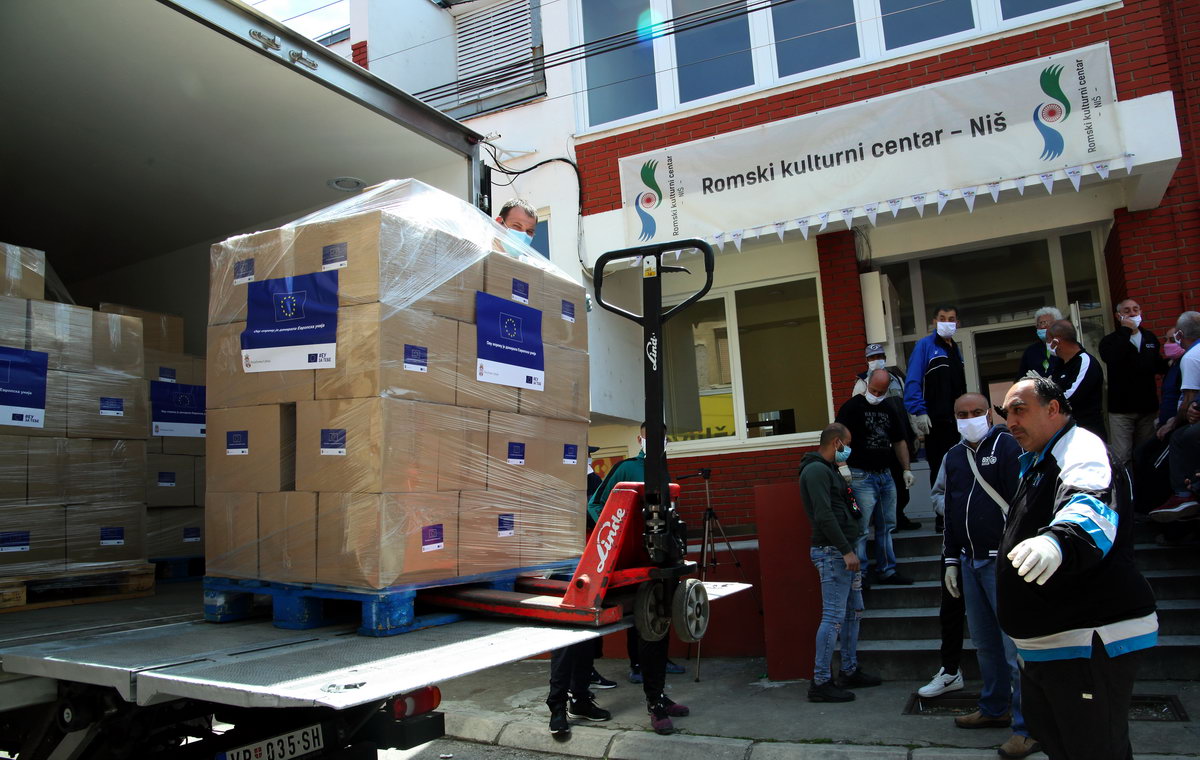
The assistance that the EU has continuously been providing to vulnerable social communities, even during the coronavirus pandemic, continues. In the following days, after 1,000 packages of food and hygienic products, another 375 packages will be delivered to Roma families in Lebane, Vranje, Niš, Subotica and Valjevo.
Around 1,000 Roma families with more than 5,000 members who live in Belgrade, Valjevo, Niš and Subotica have so far received EU packages of food and hygienic products, according to the joint statement of the Ministry of European Integration, Ministry of Construction, Transportation and Infrastructure, EU Delegation and UNOPS.
This activity is carried out in cooperation with the Ministry of European Integration, Ministry of Construction, Transportation and Infrastructure, Ministry of Labour, Employment, Veteran and Social Affairs, Social Inclusion and Poverty Reduction Unit (SIPRU), and local crisis response teams so as to ensure that the assistance is delivered to the most vulnerable citizens.
The procurement and the distribution of assistance is carried out by the United Nations Office for Project Services (UNOPS).
“We highly appreciate the assistance we as a state have received from our international partners; without it, we would not be able to successfully tackle all the challenges the COVID-19 epidemic has brought to our healthcare system and the whole society,” stated Zorana Mihajlović, Deputy Prime Minister and Head of the Coordination Body for Monitoring the Implementation of the Strategy for the Social Inclusion of Roma Men and Women in the Republic of Serbia.
“In crisis situations, it is particularly important to have regard to the needs of those members of society who belong vulnerable groups”, stated Mihajlović.
“I would like to thank the EU and UNOPS for their support in these difficult times for Serbia, and I expect us to continue working together on improving the position of Roma women and men in Serbia,” noted Mihajlović.
Minister of European Integration and National IPA Coordinator Jadranka Joksimović has said on the occasion:
“Crises such as this one caused by the spread of COVID-19 affect our most vulnerable citizens to the greatest extent, and that is why it is necessary to particularly support them when they need it the most. We are striving to show solidarity with all vulnerable groups of citizens, and this support in the form of food and hygienic products that will be delivered to more than 6,500 members of the Roma community is a part of the overall support we are providing in Serbia with the financial assistance of the EU.”
Within its global response to the fight against the current pandemic worth EUR 15.6 billion, the EU has allocated EUR 93 million for initial support to Serbia, intended for immediate, as well as short-term and medium-term measures for tackling health, economic and social effects of this health crisis.
“In these difficult times, we must be there for each other and support the most vulnerable members of society, now more than ever. Within its support package for Serbia intended for the fight against COVID-19, the European Union has invested EUR 200,000 to help vulnerable communities. In this way, the EU has provided assistance to over 1,000 Roma families with over 5,000 members in four cities in Serbia, but it has also provided support to 14,000 women and elderly citizens in 50 remote municipalities in Serbia,” stated Head of the EU Delegation to Serbia Sem Fabrizi.
This population has been particularly vulnerable during this crisis, in addition to the health risk we are all under due to the coronavirus, stated Fabrizi.
“The EU will continue to help them all. No one must be disregarded,” added Fabrizi.
Assistance packages intended for Roma families, which contain hygienic products and essential food commodities, such as flour, sugar, oil, rice, canned meat and fish products, have been delivered with the support of four civil society organisations: Centre for Youth Integration from Belgrade, Association of Roma Affairs Coordinators from Valjevo, League of Roma from Niš and Roma Education Centre from Subotica.
President of the Standing Conference of the Roma Associations of the Citizens (SKRUG) – League of Roma from Niš, Osman Balić, has said that, even though the entire society is affected by the COVID-19 pandemic, the Roma community is additionally affected, because almost 70% of the Roma population works in an informal sector, i.e. makes their living by collecting secondary raw materials.
“During a month and a half of the emergency state, they were mostly without income, which is why we are particularly grateful to the EU for this generous assistance,” said Balić.
The European Union continues to support vulnerable population groups, while more than EUR 40 million has been invested in the improvement of their position in the past seven years, as noted in the statement.
Source: Tanjug





